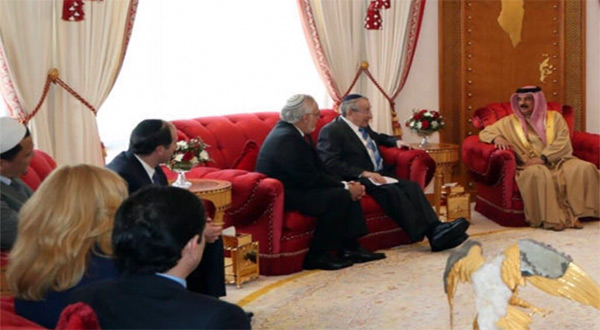The Maariv daily reported on one such meeting between Bahrain's King Hamad bin Isa Al Khalifa and the director of the Wiesenthal Center in Los Angeles, Rabbi Abraham Cooper, and his colleague Rabbi Marvin Hier. The meeting took place at a ceremony under the title "Rejecting Hatred between Religions" where the King declared that "Bahrain condemns hatred and religious violence", stressing "that Bahraini citizens are now free to visit 'Israel'."
This meeting was not coincidental but came in response to an "interesting" visit by the rabbis to Manama earlier this year. The meeting was the same as the other meetings between officials from Bahrain and "Israel". The pace of these meetings, contacts and attitudes intensified recently in a remarkable manner culminating in a declaration by the "Israeli" Prime Minister Benjamin Netanyahu at the beginning of September.
"There are secret relations between "Israel" and many Arab and Islamic countries", Netanyahu said as he described the current situation as "unprecedented".
It is worth noting that Bahrain has been the pioneer since 1994 in revealing its relations with "Israel" under clear Saudi coverage. Bahrain has for decades played the role of mediator as well as a direct and indirect facilitator of the arrangement of Saudi-"Israeli" relations. The task is led by the King of Bahrain himself and his Foreign Ministry. There are a lot of stations and positions that emphasize the direct political and economic link between Bahrain and "Israel", as well as the exchange of visits openly and publicly between the officials of both sides and the landing of "Al-Aal" aircraft at the Manama airport.
This is not the first time that the King of Bahrain has met with Israeli religious figures and rabbis. In March, he met with Rabbi Marc Schneier, president of the New York-based Foundation for Ethnic Understanding. According to the Jerusalem Post, the king confirmed during the meeting that "‘Israel' is capable of defending not only itself but the voices of moderation and moderate Arab countries in the region." Meanwhile, Schneier pointed out that "opening diplomatic channels between some Arab countries and ‘Israel' is a matter of time," noting that "the common animosity of Persian Gulf countries and ‘Israel' towards Hezbollah and its Iranian sponsors should be used as an opportunity to create an alliance with those countries that were previously hostile to ... [‘Israel']"
This is the millstone that revolves around a political-diplomatic combination that has been vigorously pursued following the Riyadh conference and the speech of US President Donald Trump, which calls for a new equation for relations in the region. Of course, "Israel" will be the main center of polarization with allied and friendly organizations and countries circling its orbit. This equation will result in an Arab-"Israeli" alliance sponsored by the United States, mainly to face Iran. This is what Trump discussed in occupied Palestine, which was his second stop immediately after Saudi Arabia.
Experience has shown that any media leak of any activity or event related to the Arab-"Israeli" relationship is based on actual facts, most notably the recent visit by a Saudi prince [Crown Prince Muhammad bin Salman] to occupied Palestine and his meeting with Zionist officials to discuss the settlement of the Palestinian dossier. Regardless of the "Israeli" amplification of this event and its dimensions and data, this is one of the requirements of the political game and the process of direct involvement. But linking the data leads to a certain conclusion that there is an accelerated effort to resolve the situation in the region, especially as the wars in Syria and Iraq near their conclusion with a victory for what the west calls "Iran's alliance" and the failure of American-"Israeli"- Persian Gulf wagers on breaking of this alliance. Hence, the action is now focused on sidestepping this victory with a greater political achievement and one that the war failed to produce.
What is certain is that "Israel" does not consider the normalization of relations with Bahrain an achievement. The "Israelis" are focused on Saudi Arabia. But this requires a huge cause as huge as the size of the target. So a larger headline must be arranged to pave the way for opening the road between Tel Aviv and Riyadh. In this case, diplomatic sources point to what has recently been negotiated under the table and aims to create a barter of sorts, where "Israel" agrees on a final solution formula to the Palestinian issue in exchange for a comprehensive and systematic normalization of relations between "Israel" and the Arab countries, especially the Persian Gulf including Saudi Arabia. Sources indicate a key role that Egypt is playing in this formula. It is the central member of the newly emerging four-party alliance against Qatar. The same sources point to the Egyptian role in pressuring the internal Palestinian establishment, particularly the tackling of rifts between Hamas and the Palestinian Authority, to keep pace with the new arrangements.
/106

